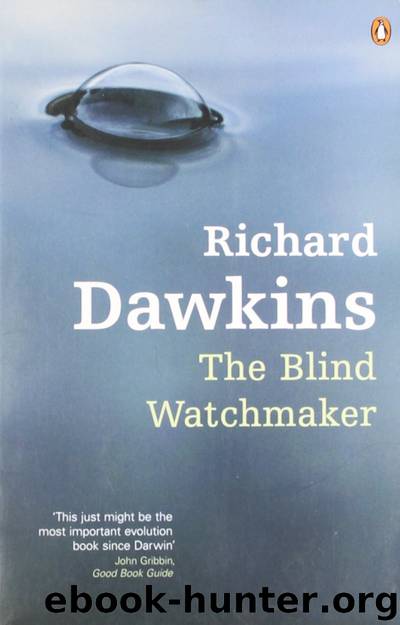The Blind Watchmaker: Why the Evidence of Evolution Reveals a Universe Without Design (Reissued 1996) by Richard Dawkins

Author:Richard Dawkins [Dawkins, Richard]
Language: eng
Format: epub
ISBN: 9780393315707
Amazon: 0393315703
Publisher: Penguin Books Ltd
Published: 2006-04-24T21:00:00+00:00
These three statements represent three benchmark views about the uniqueness of life. The actual uniqueness of life probably lies somewhere between the extremes represented by Statement 1 and Statement 3. Why do I say that? Why, in particular, should we rule out a fourth possibility, that the origin of life is a far more probable event than is suggested by Statement 3? It isn’t a strong argument, but, for what it is worth, it goes like this. If the origin of life were a much more probable event than is suggested by the Solar System Number we should expect, by now, to have encountered extraterrestrial life, if not in (whatever passes for) the flesh, at least by radio.
It is often pointed out that chemists have failed in their attempts to duplicate the spontaneous origin of life in the laboratory. This fact is used as if it constituted evidence against the theories that those chemists are trying to test. But actually one can argue that we should be worried if it turned out to be very easy for chemists to obtain life spontaneously in the test-tube. This is because chemists’ experiments last for years not thousands of millions of years, and because only a handful of chemists, not thousands of millions of chemists, are engaged in doing these experiments. If the spontaneous origin of life turned out to be a probable enough event to have occurred during the few man-decades in which chemists have done their experiments, then life should have arisen many times on Earth, and many times on planets within radio range of Earth. Of course all this begs important questions about whether chemists have succeeded in duplicating the conditions of the early Earth but, even so, given that we can’t answer these questions, the argument is worth pursuing.
If the origin of life were a probable event by ordinary human standards, then a substantial number of planets within radio range should have developed a radio technology long enough ago (bearing in mind that radio waves travel at 186,000 miles per second) for us to have picked up at least one transmission during the decades that we have been equipped to do so. There are probably about 50 stars within radio range if we assume that they have had radio technology for only as long as we have. But 50 years is just a fleeting instant, and it would be a major coincidence if another civilization were so closely in step with us. If we embrace in our calculation those civilizations that had radio technology 1,000 years ago, there will be something like a million stars within radio range (together with however many planets circle round each one of them). If we include those whose radio technology goes back 100,000 years, the whole trillion-star galaxy would be within radio range. Of course, broadcast signals would become pretty attenuated over such huge distances.
So we have arrived at the following paradox. If a theory of the origin of life is sufficiently ‘plausible’
Download
This site does not store any files on its server. We only index and link to content provided by other sites. Please contact the content providers to delete copyright contents if any and email us, we'll remove relevant links or contents immediately.
| Fossils | Game Theory |
| Genetics | Molecular Biology |
| Organic | Paleontology |
Sapiens: A Brief History of Humankind by Yuval Noah Harari(14368)
Sapiens by Yuval Noah Harari(5366)
Pale Blue Dot by Carl Sagan(4996)
Homo Deus: A Brief History of Tomorrow by Yuval Noah Harari(4908)
Livewired by David Eagleman(3764)
Origin Story: A Big History of Everything by David Christian(3687)
Brief Answers to the Big Questions by Stephen Hawking(3429)
Inferior by Angela Saini(3311)
Origin Story by David Christian(3194)
Signature in the Cell: DNA and the Evidence for Intelligent Design by Stephen C. Meyer(3130)
The Gene: An Intimate History by Siddhartha Mukherjee(3094)
The Evolution of Beauty by Richard O. Prum(2993)
Aliens by Jim Al-Khalili(2827)
How The Mind Works by Steven Pinker(2813)
A Short History of Nearly Everything by Bryson Bill(2689)
Sex at Dawn: The Prehistoric Origins of Modern Sexuality by Ryan Christopher(2513)
From Bacteria to Bach and Back by Daniel C. Dennett(2481)
Endless Forms Most Beautiful by Sean B. Carroll(2473)
Who We Are and How We Got Here by David Reich(2431)
